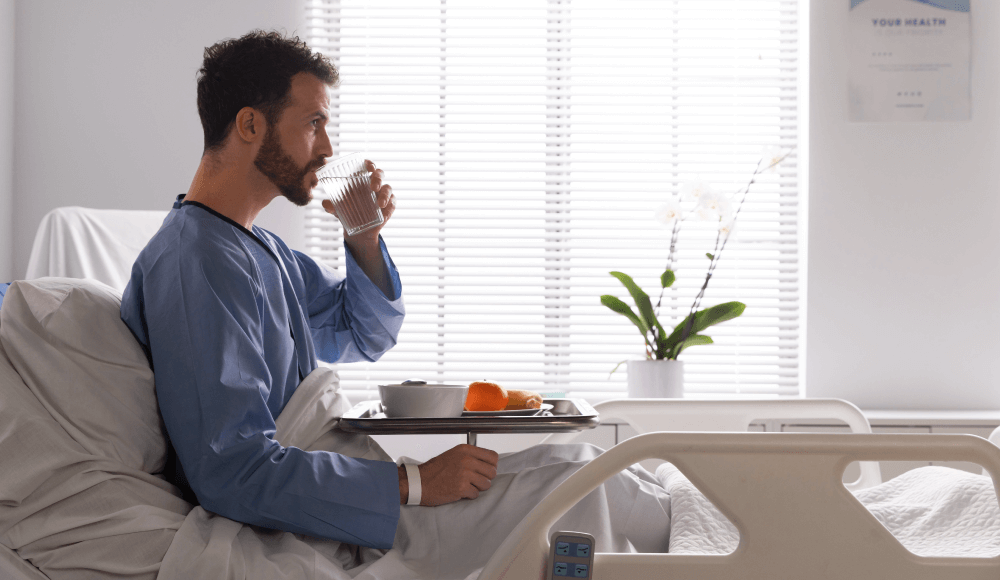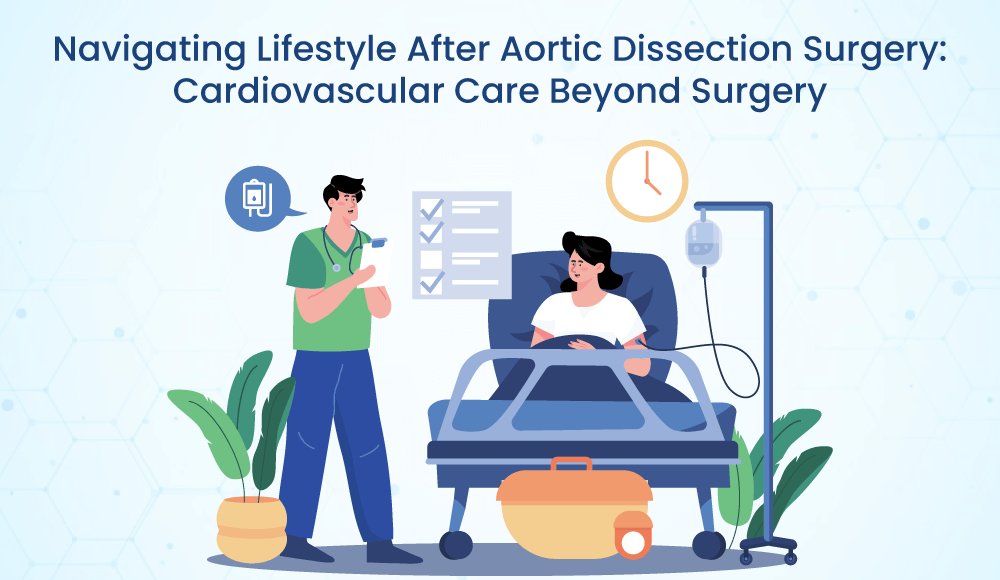Aortic dissection is a very critical condition where the aorta, the major artery that carries blood out of the heart, has a tear in its wall. Due to the tear extension on the aorta’s wall, the blood will abnormally flow within the layers of dissection or the blood vessel wall. Thus, this condition is called aortic dissection.
Ignoring the condition can lead to internal bleeding, organ damage, or stroke, or might even trigger other serious conditions. Fortunately, there’s a successful treatment procedure for the condition. But, the lifestyle after aortic dissection surgery should be more disciplined than ever to speed up the recovery!
This article will help you with what lifestyle adjustments you need to make to speed up your recovery and take care of your cardiovascular health after the aortic dissection surgery.
Get Back To Your Life Before Aortic Dissection Surgery With Holistic Recovery. Book An Appointment Today!
A] Recovery After Aortic Dissection Surgery
Once your doctor is done with the aortic dissection surgery, they would advise you to be rested for recovery for a month. But, if you have undergone a proper aortic dissection surgery, then expect to be at the hospital for at least one week.
Depending on the complications, the doctors might keep you under observation for more than a week. Right after the treatment, doctors will recommend you not drive for a week or two, quit smoking for the next few months, and prevent lifting anything heavy.
B] Transitioning to a Heart-Healthy Lifestyle
Life after surgery will be a bit difficult for you to adapt to, but your doctor will help you transition to a completely heart-healthy lifestyle. Some of the things that are important to ensure your good heart health post-surgery are:
1. Embracing Dietary Changes

The food you consume will impact your heart health directly, especially after the aortic dissection treatment. Changing your diet will help control certain conditions such as blood sugar and cholesterol. Some of the heart-healthy foods or dietary changes that are recommended for your heart health are:
- Stick to a low-salt diet.
- Consume more vegetables and fruits.
- Prefer eating healthy fats.
- Add fibre-rich whole grains to your diet.
- Consume fish as it is rich in healthy protein.
- Avoid dairy or animal fat.
- Lower your red meat or dessert consumption.
- Maintain sodium intake and meet nutritional needs.
2. Staying Active Safely
You must try and lead yourself to live a healthy lifestyle after the surgery for aortic dissection. Perform light exercises and go slow on reintroducing yourself to the exercises post-surgery. Increase the intensity gradually, and choose the activities according to what supports your health better.
Doing exercises at your own pace after the surgery will help you increase your oxygen uptake and improve your quality of life post-rehabilitation.
3. Stress Management and Mental Health
Managing your stress and holding onto your mental health is equally important after your aortic dissection surgery. There are a few ways you can try to attain both of them, which include:
- Get sufficient sleep.
- Do enough exercise.
- Learn relaxation techniques.
- Confront stressful situations and deal with them.
- Prefer nurturing yourself.
C] Medication Adherence and Monitoring
Beyond self-care, there is some amount of recovery and post-surgery healing done with medications and consistent health monitoring:
1. Medications for the Long-Term Care
Some of the prescribed medications for long-term care after aortic dissection surgery include:
- Beta-blockers or various other antihypertensive medications
- Pain medications
You must keep taking your medications on time to ensure the blood pressure stress is reduced on the wall or aorta. Thus, the pain associated with aortic dissection will be reduced, and the condition won’t worsen further.
In some cases, pain medications aren’t recommended for patients with multiple health conditions. It might result in bleeding and might be fatal for someone who has undergone aortic dissection.
2. Regular Check-Ups and Follow-Up Appointments
You must stay connected with your cardiac surgeon in Mumbai and take the follow-up treatments seriously. They will help monitor your recovery progress and detect any possible complications at the earliest.
Be part of collaborative healthcare with your cardiac surgeon to optimise the care needs for your heart health.
D] Building A Supportive Network
The importance of a supportive network is undeniable with respect to speeding up the recovery after aortic dissection surgery and caring for your heart beyond it:
1. Family and Friends: Understanding and Support
The doctors will educate your loved ones about the aortic dissection condition and help them understand their role in helping you in this recovery journey. Your family and friends will play a big role in providing you with emotional support and effective communication to be fit and healthy again.
2. Joining Support Groups
There are many groups and communities where many people with a history of aortic dissection will come together to network and discuss each other’s recovery phase. People will have the liberty to share advice and experiences. Following that, people can spread encouragement for patients to cope with the treatment procedure.
E] Looking Ahead: Long-Term Cardiovascular Health
In terms of looking after the long-term cardiovascular health after surgery, here are things you should take note of:
1. Risk Factors and Prevention Strategies
Identifying and managing the risk factors associated with recurrent dissection is of utmost importance for prolonged care. Some of the risk factors include:
- High blood pressure or hypertension
- Abnormal bulge or enlargement in the aortic wall
- Aortic valve disease, especially bicuspid aortic valve
- Period-extending activities, such as using amphetamine or cocaine
- Connective tissue disorders
Keep these risk factors in check just to prevent the condition from returning. Connect with your doctor to screen your health conditions regularly and run necessary tests as well.
2. Celebrating Milestones and Progress
You ought to acknowledge all your personal achievements in terms of changing your lifestyle or food habits after the surgery. Keep setting some realistic goals to keep your body healthy and track the progress. Look up to the recovery journey with a positive mindset.
Also, read our guide, ‘Lifestyle Changes You Need to make For A Healthy Heart.’ Making these lifestyle changes will ensure that you have a fulfilling life after your aortic dissection surgery.
Conclusion
This article gives you clarity on some of the most effective recovery and care measures to help you improve your cardiovascular health after the aortic dissection surgery. Comprehensive cardiovascular care is of utmost importance to identify the potential risks that might cause heart strokes or attacks. It will help prevent any kind of recurrent events with heart health.
So, get along with the process of coping with your heart health after aortic dissection surgery, and follow the tips specified above! If you are experiencing any kind of issue with respect to maintaining an optimal heart-healthy lifestyle, get in touch with an expert. Also, check out our page on aortic valve replacement cost in Mumbai to stay informed about the subject.
Dr. Vishal Khullar is one of the best cardiac surgeons to help you recover from the post-surgery effects of aortic dissection. Contact us today to book an appointment!
Get Back To Your Life Before Aortic Dissection Surgery With Holistic Recovery. Book An Appointment Today!



